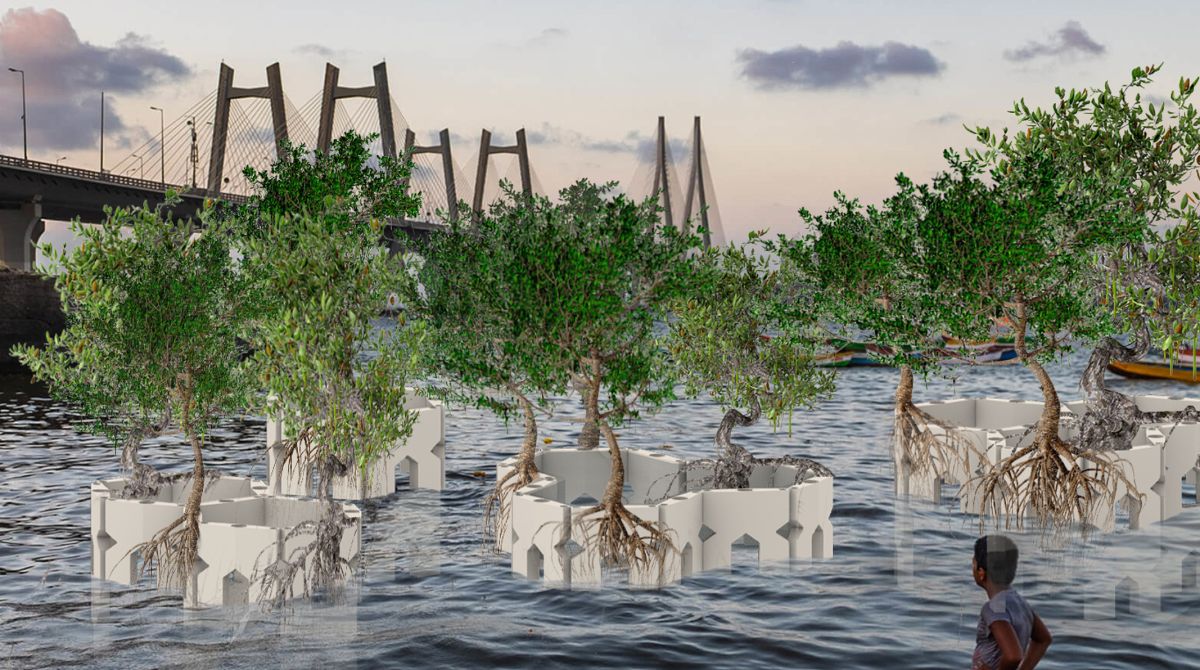Vulnerable communities and the challenges of land use in the future part of ‘S Bomb' sustainability exhibition by Kingston School of Art students
Posted Friday 28 October 2022
 The exhibition from MA Sustainable Design students included Deveshree Sawant's project which addressed the depletion of mangroves, once plentiful off the coast of Mumbai.
The exhibition from MA Sustainable Design students included Deveshree Sawant's project which addressed the depletion of mangroves, once plentiful off the coast of Mumbai.
Postgraduate Kingston University students shared innovative ideas for a more sustainable future as part of an exhibition hosted by Kingston Museum.
The graduate showcase featured 11 projects from MA Sustainable Design students alongside a variety of events taking place throughout the fortnight, including talks, practical demonstrations and a podcast recording with creative writing and English literature lecturer James Miller about his involvement with XR Rebel, a group made up of writers concerned with climate change.
One of the students unveiling their work at the exhibition was Deveshree Sawant, whose project, Redefining the Edge, focused on supporting the coastal communities of Mumbai. Having grown up in the Indian city, Deveshree wanted to apply her learning close to home and worked with indigenous fishing communities to help develop an organisation focused on sustainability within the community.
Her project addresses the depletion of mangroves that were once plentiful off the coast and encouraged a wide and diverse range of ecological life. Supported by a website which hosts her open source design, it centres around a modular concept which encourages mangrove regeneration, which in turn could help communities battle the consequences of construction and overpopulation. "These vulnerable communities have not done anything to trigger climate change, but they are feeling the effects the most," she said. "The idea is to help them achieve climate resilience through economic and ecological advancement."
Although mangroves were hardy, can stop floods and help sea level rise, they fail to grow when not used properly, Deveshree said. "There are a number of mangrove regeneration projects but a lot of the time they fail. My system is designed to help them grow through a modular system that acts as a helping hand for actual mangrove plantation."
 Barbara San Roman proposed a systemic solution to the problem of demand for land, called Rayse, it incorporates agriculture and solar energy production within the same plot of land.Another of the student projects examines how demand for land from both the agricultural sector and the renewable energy sector can be utilised to satisfy demand from both industries. Barbara San Roman has proposed a systemic solution, called Rayse, which incorporates agriculture and solar energy production within the same plot of land - creating a symbiotic relationship between the two.
Barbara San Roman proposed a systemic solution to the problem of demand for land, called Rayse, it incorporates agriculture and solar energy production within the same plot of land.Another of the student projects examines how demand for land from both the agricultural sector and the renewable energy sector can be utilised to satisfy demand from both industries. Barbara San Roman has proposed a systemic solution, called Rayse, which incorporates agriculture and solar energy production within the same plot of land - creating a symbiotic relationship between the two.
This could see solar panels used as protection for the crops, as well as generating energy for the surrounding town, the farmers and for the national grid, she said. "Food and energy production are the two most polluting processes humans do," she explained. "Companies compete to find land they can both use for their businesseses. We need both energy and food, so the clash between the two industries doesn't make much sense."
Recognising the need to find ways communicate her ideas to different sectors, Barbara created four specifically targeted booklets for her different audiences – farmers, solar energy companies, government departments and sustainability advisors. Each booklet outlines the benefits for each party, utilising design thinking to influence thought leaders and decision makers. "The course pushed me to explore new things, which I really enjoyed", she said. "Deveshree and I have now started a podcast which will document our process and what we are learning along the way, becoming a diary of how the world of sustainability is evolving."
Course leader Dr Paul Micklethwaite, who hosted a discussion on the need for positive thinking in relation to sustainability during the exhibition, said it was important to engage with local communities nd provide a platform for sustainable design thinking. "The ethos of the course has long been that sustainability is a local agenda as much as a worldwide agenda," he said. "We have nurtured relationships with regional partners and students have taken part in a range of projects across the local area, where there is a strong interest in sustainability and a growing recognition of the gravity of the situation and the need to act quickly collectively."
 Barbara San Roman, Deveshree Sawant and Dr Paul Micklethwaite at the S Bomb exhibition.
Barbara San Roman, Deveshree Sawant and Dr Paul Micklethwaite at the S Bomb exhibition. - Find out more about studying MA Sustainable Design at Kingston University.
- Follow MA Sustainable Design on instagram.
Contact us
General enquiries:
Journalists only:
- Communications team
Tel: +44 (0)20 8417 3034
Email us



